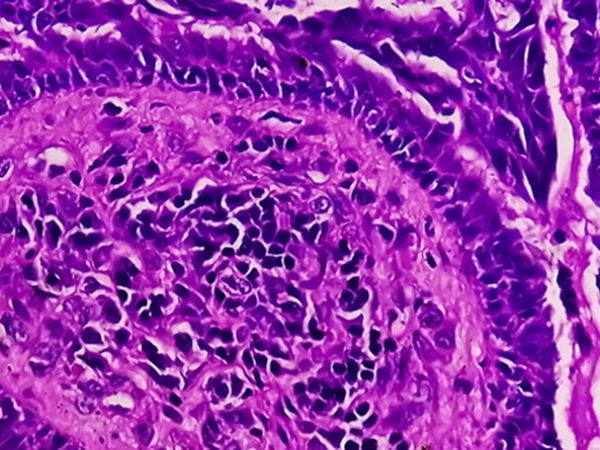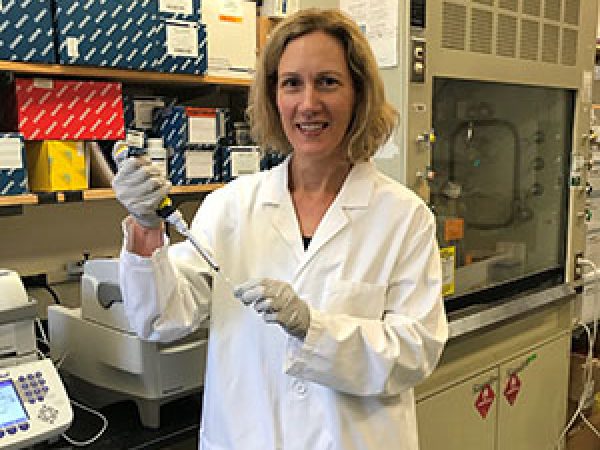Foti Scholarship Awardee Hopes to Empower Underserved Communities Through Science Communication
Janet Mosugu draws her passion for public health back to her childhood in Nigeria, when she first encountered the book “Where There Is No Doctor.” A health care guide for under-resourced communities, the book showed young Mosugu the power of medicine, as well as the barriers that prevent so many across the globe from benefiting from it. It also exposed her to the concept of medical self-sufficiency—the ability of communities to help themselves when they are unable to access care from other sources.

Her passion for health care led her to degrees in veterinary medicine, public health, and communication. Now, Mosugu is starting a one-year internship with the American Association for Cancer Research (AACR) to hone her science communication skills.
The internship follows a master’s program in Communication for Development and Social Change at Temple University, which Mosugu completed as the first recipient of the Margaret Foti Scholarship. Sponsored by AACR Chief Executive Officer Margaret Foti, PhD, MD (hc), the prestigious scholarship provides full financial support to selected graduate students at the Temple University Klein College of Media and Communication, Foti’s alma mater.
Mosugu discussed her inspiration, past experiences, and long-term goals with the AACR blog, Cancer Research Catalyst.
What inspired you to pursue health communication?
After receiving my postgraduate degree in public health, I ventured into field research because of my passion for community health. During this time, I saw that a lot of communities in Nigeria were resistant to receiving health interventions like vaccines even if they were incentivized or offered free of charge. There are a lot of misconceptions and superstitions surrounding medical interventions in Nigeria, and, while some communities will readily accept interventions, others will not. That triggered my interest in using strategic communications to combat medical misinformation and ultimately improve health in communities like these.
I am also passionate about increasing awareness about cancer, particularly for women and children, who do not have a voice in Nigeria and many other parts of Africa. My own mother died of cancer. Because of the prevalent knowledge gaps about cancer, even though she had her symptoms checked early, medical personnel disregarded her concerns and sent her home. She wasn’t diagnosed until the cancer had progressed to stage 3, and by then it was too late.
This is something that happens to a lot of people. Even if they have the resources to access medical facilities, they are not convinced to go for cancer screening. Many people may not believe that their symptoms are from cancer, so they just wave it off. Then, there’s the entirely different ballgame of people who don’t even have access to health care.
What did your graduate training at Temple University focus on?
The Temple University graduate program, Communication for Development and Social Change, was focused on communication that is community centered and people centered—communication for empowerment and advocacy, rather than for commercial purposes. It was about empowering communities towards self-sufficiency, just like the teachings in “Where There Is No Doctor.” The goal is to teach communities to come up with strategies to help themselves so they are not reliant solely on the health care that comes to them. The program also focused on helping communities find their own voices because what works for one community may not work for another.
As part of the program, I completed a capstone project with Temple Health that aimed to improve communication about menopausal health within the predominantly Black North Philadelphia community. Menopause is something that is not often talked about, but it can have a huge impact on a person’s physical and emotional well-being. Many women of menopausal age in this community are single mothers or, even if they are married, are the predominant breadwinners of the family. Menopause symptoms can impact their ability to work, so it can impact financial well-being as well.
We learned about the different cultural and religious perspectives on menopause and advised religious and community leaders to be involved in developing communication strategies. We also recommended that communications be offered in the preferred language of the community, whether that is English, Spanish, or something else. In addition, we worked to empower menopausal-age women to become mentors for younger generations on this topic. Overall, the message we wanted to convey was that managing menopause requires a holistic approach to address both the emotional and physical symptoms—symptoms that can vary widely between individuals.
What did receiving the Margaret Foti Scholarship mean to you?
The Margaret Foti Scholarship meant a lot to me because even though I’m passionate about getting an advanced degree in health communication, I would have been financially pressed. By taking away the financial pressure, this scholarship allowed me to focus on my studies and give it my best.
I’ve been so blessed to not only receive the scholarship but for it to come from someone I find so inspiring. I was impressed by Dr. Foti’s record in health communication and how she has focused on simplifying complex scientific findings to make it relatable to the general public. I’m inspired by how the organization has collaborations globally, especially in low- and middle-income countries, to advance cancer care for all.
Dr. Foti’s work speaks to questions I’ve been asking myself for years: how can we empower communities to find their voices, how can we use communication to motivate people to change for their own benefit?
What do you hope to accomplish during your internship with the AACR?
I would love to sharpen my skills in health communication to be able to communicate complex scientific discoveries to a nonscientific audience to ultimately help underserved communities appreciate scientific discoveries and improve the optics of health services. I also hope to gain experience using blogs and social media to communicate science. Most people are not so interested in reading scientific publications, but if we can communicate advances to them quickly through short, digestible blog or social media messages, they might be more willing to engage with that.
What are your long-term goals?
My career goal has always been to empower communities to take charge of their health—and by health, I’m not just particular about clinical health alone. I like this definition of health as the totality of physical, mental, and social well-being.
When you can communicate medical information to the communities—especially underserved communities—there will be better health for all and greater self-sufficiency within the communities to overcome external barriers to health care.
I challenge myself to understand how best to communicate health interventions because no matter how much breakthrough medical research makes, if you cannot properly communicate it to people, it will not be able to help all those who need it.



